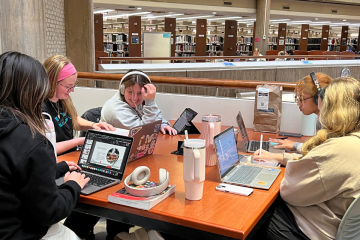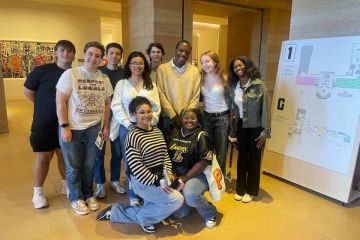Widener/CCCP Partnership Strengthens Next-Gen Culturally Competent Providers

A partnership between Widener and the Coalition of Culturally Competent Providers is inviting new conversations about community care into the university, and resulting in exciting opportunities for students in health and human services programs.
The coalition, a strong network of behavioral health providers across the Philadelphia region, seeks to connect providers, educators, and the communities they serve to advance the use of culturally competent policies, practices, and programming.
Cultural competency reflects a holistic approach to understanding how people experience the world due to unique and diverse cultural factors, and then providing care with that knowledge in mind.
“We believe that having a provider who can relate to you and truly understand your background, history, beliefs, and culture makes a world of difference in quality of care,” Asher Kemp Jr., the coalition’s executive director, said. “We deal in the social and emotional determinants of health, considering a broad range of factors when it comes to treating a person.”
Widener has long prioritized cultural competency in its programs, especially for health and human service professions. The coalition’s partnership with Widener began with the clinical psychology/PsyD program, but since the pandemic, that relationship has grown to include social work, physical therapy, occupational therapy, nursing, and speech-language pathology departments.
For students, this means networking with employers in their fields of study, and increased access to internship opportunities and beyond.
The coalition “is a solid resource for our community, dedicated to leveraging the power of relationship and collaboration to bring together leaders in community health and provide resources and guidance for all,” Mary Rourke, director of the Institute for Graduate Clinical Psychology said.
“Our educators and, by association, our students, gain access to discussions about how community agencies are developing and strengthening systems of delivering culturally competent care,” she explained. “Our coursework and training are strengthened via access to resources and inclusion in these discussions.”
Training Today’s Students
Widener hosted coalition members, including behavioral health providers, for a September campus visit. They learned about the university’s programs and clinics, including the Child Therapy Clinic where doctoral students provide mental health treatment for children and adolescents, and therapy for families, and the Widener Community Clinic, where local residents can receive physical therapy, occupational therapy, speech language therapy and more at low or no cost. Students got to enjoy lunch and network with these potential future employers on the day of the coalition visit.
“When I started out in the behavioral health industry, I never got a chance to meet the VP or CEO of a company I interned at,” Kemp remarked. “Giving Widener students the chance to break bread with (coalition) partners develops mentorship connections and helps pass forward valuable professional knowledge.”
Kemp noted that the interdisciplinary nature of Widener’s programs fits right into the coalition’s mission of supporting diverse communities and treating the whole person.
“Widener lives at the cutting edge with innovative programs that speak to both relevant practical training and vital business skills,” he said.
From programs like the dual degree MBA/PsyD to accelerated advantage opportunities for any major to add a master’s degree to their education, Kemp lauded Widener’s unique programs that reflect the needs of today’s professionals across industries.
Ultimately, Widener’s role in the coalition is about empowering the next generation of health and human service professionals to provide quality care to their communities. That takes practice, and the coalition supports students all the way.
“We’ve built an internship rotation for several students as a result of our collaboration with (the coalition) and as a direct result of that September event, we’re also exploring a partnership with a community agency that will both expand the agency’s ability to offer services and will provide solid training opportunities for our students,” Rourke said.



